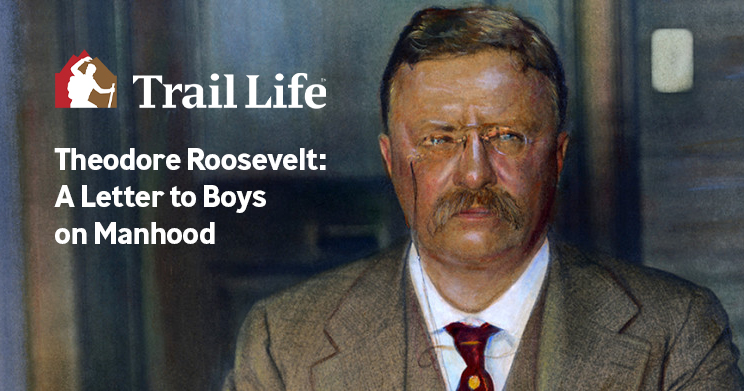Theodore Roosevelt: A Letter to Boys on Manhood
No one can be a good American unless he is a good citizen, and every boy ought to train himself so that as a man he will be able to do his full duty to the community …[to] act in a way that will give them a country to be proud of.
No man is a good citizen unless he so acts as to show that he actually uses the Ten Commandments, and translates the Golden Rule into his life conduct–and I don’t mean by this in exceptional cases under spectacular circumstances, but I mean applying the Ten Commandments and the Golden Rule in the ordinary affairs of every-day life. I hope boys will
Indeed the boys even while only boys can have a very real effect upon the conduct of the
grown up members of the community, for decency and square dealing are just as contagious as vice and corruption. Every healthy boy ought to feel and will feel that in order to amount to anything, it is necessary to have a constructive, and not merely a destructive, nature; and if he can keep this feeling as he grows up he has taken his first step toward good citizenship. The man who tears down andcriticizes and scolds may be a good citizen, but only in a negative sense; and if he never does anything else he is apt not to be a good citizen at all. The man who counts, and the boy who counts, are the man and boy who steadily endeavor to build up, to improve, to better living conditions everywhere and all about them. But the boy can do an immense amount right in the present, entirely aside from training himself to be a good citizen in the future; and he can only do this if he associates himself with other boys.
The same qualities that mean success or failure to the nation as a whole, mean success or failure in men and boys individually. …To be helpless, self-indulgent, or wasteful, will turn the boy into a mighty poor kind of a man, just as the indulgence in such vices by the men of a nation means the ruin of the nation. Let the boy stand stoutly against his enemies both from without and from within, let him show courage in confronting fearlessly one set of enemies, and in controlling and mastering the others. Any boy is worth nothing if he has not got courage, courage to stand up against the forces of evil, and courage to stand up in the right path. Let him be unselfish and gentle, as well as strong and brave.
It should be a matter of pride to him that he is not afraid of anyone, and that he scorns not to be gentle and considerate to everyone, and especially to those who are weaker than he is. If he doesn’t treat his mother and sisters well, then he is a poor creature no matter what else he does; just as a man who doesn’t treat his wife well is a poor kind of citizen no matter what his other qualities may be. And, by the way, don’t ever forget to let the boy know that courtesy, politeness, and good manners must not be neglected. They are not little things, because they are used at every turn in daily life. Let the boy remember also that in addition to courage, unselfishness, and fair dealing, he must have efficiency, he must have
knowledge , he must cultivate a sound body and a good mind, and train himself so that he can act with quick decision in any crisis that may arise. Mind, eye, muscle, all must be trained so that the boy can master himself, and thereby learn to master his fate.
Very sincerely yours,
THEODORE ROOSEVELT.
Full Letter found in 1911 First Edition Boys Scouts Handbook available below:



